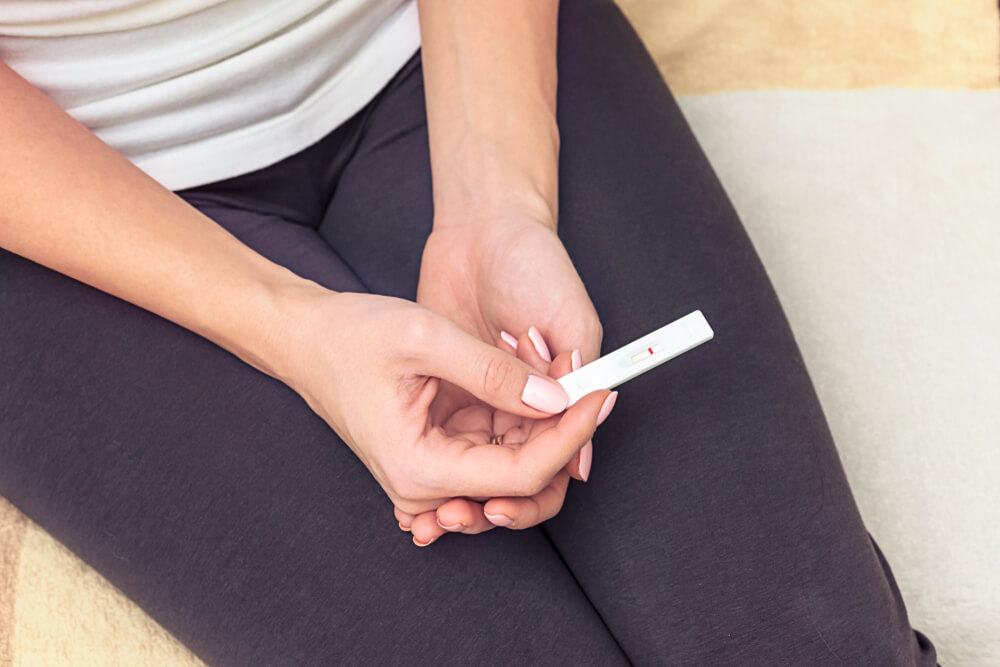Disclaimer: Please note that this blog is for educational purposes only, it includes general information on health-related topics. Women’s Healthcare of Boca Raton is giving medical advice to Patients Only. Follow this link to request an appointment with Dr. Ellman.
It’s a common question that many couples ask themselves at some point: why am I not getting pregnant? There are many possible reasons for infertility, and it can be difficult to determine the cause. This article will explore some of the most common reasons women can’t get pregnant. Read on to learn more.
What Is The Best Time of Month to Get Pregnant?
For women trying to conceive, the best time of the month to get pregnant is typically a little bit before or during ovulation. However, not all women ovulate at the same time every month. For example, a woman with a 30-day cycle would ovulate on the 16th day, while another woman whose cycle is 40 days long would ovulate on the 26th day.
For this reason, it’s important to track your fertility signs (such as basal body temperature and cervical mucus) to determine when you are most fertile.
As well as that, there are ovulation tests you can buy to help you pinpoint your most fertile days.
Can You Get Pregnant if You’re Not Ovulating?
There is a very slight chance of pregnancy when you’re not ovulating. However, this is only because sperm can live inside the body for up to five days, so there’s a chance of conception if intercourse occurs near the time of ovulation. The answer to the question “can you get pregnant without ovulating” is no, though.
Typically, if you’re not ovulating, you will not be releasing an egg each month, and therefore you will not get pregnant. This is called having an anovulatory cycle, and it is one of the most common causes of infertility and abnormal bleeding.
Why Am I Not Getting Pregnant: How Long Should I Try?

For couples who are trying to conceive, it’s recommended that they try for a year before seeking medical help. This is because, in most cases, infertility is due to an unknown factor or a malefactor. However, if you have been trying for a year and you’re not pregnant, then it’s time to see your obstetrician in Boca Raton. They will be able to run tests to determine the cause of your infertility and help you find a solution best suited to your situation.
-
Why Am I Not Getting Pregnant: It Might Be Your Partner
In many cases, infertility is due to a malefactor. This could be due to low sperm count, poor sperm motility, or even genetic defects in the sperm. If it’s determined that you’re not getting pregnant because of a malefactor, then there are treatments available that can help improve fertility.
However, in some cases, the malefactor is irreversible. If this is the case, then your doctor may recommend using assisted reproductive technologies (ART) such as in-vitro fertilization (IVF).
-
Why Am I Not Getting Pregnant: It Might Be Your Age
Age is a common factor that can affect fertility. As a woman gets older, her chances of getting pregnant naturally decrease. This is because the quality and quantity of eggs decrease as a woman ages, and it becomes more difficult to conceive.
With the help of fertility treatments, many women over 40 are able to conceive. However, this doesn’t mean that it’s impossible to get pregnant after 40. If you’re concerned about your age and its effect on your fertility, then talk to your doctor about your options.
-
Take Secondary Infertility Into Consideration
Secondary infertility is defined as the inability to conceive after previously being able to get pregnant. This could be due to a number of factors, such as age, health problems, or lifestyle choices.
If you’re experiencing secondary infertility, then it’s important to seek medical help. Many treatments can help you conceive, so don’t hesitate to seek out the best women’s healthcare Boca Raton has to offer.
-
Blocked Fallopian Tubes Might Be The Cause
Blocked fallopian tubes are a common problem for women who are trying to get pregnant. This is when the tubes that carry the eggs from the ovaries to the uterus become blocked. This can prevent the egg from being fertilized by sperm and from reaching the uterus.
If you’re experiencing blocked fallopian tubes, then there are treatments available that can help unblock the tubes. This includes surgery or, in some cases, fertility drugs.
-
See If You Have Endometriosis
Endometriosis is a common condition that affects women’s reproductive organs. This is when the tissue lining the uterus (endometrium) grows outside the uterus. This can cause pelvic pain, heavy periods, and regular periods but not getting pregnant.
There is no cure for endometriosis, but there are treatments available that can help relieve symptoms. If you think you may have endometriosis, it’s best to discuss your symptoms with our friendly staff.
-
PCOS is A Common Cause
PCOS is a common disorder that affects a woman’s hormones. This is when the body produces too much testosterone, which can lead to problems such as irregular periods, excessive hair growth, and infertility.
There is no cure for PCOS, but there are treatments available that can help control symptoms. If you think you may have PCOS, then talk to your doctor about your options.
-
Stress Might Be Affecting Your Fertility
Yes, stress can affect a woman’s ability to get pregnant. This is because stress can cause changes in hormone levels, which can impact ovulation and fertility.
If you’re experiencing stress due to having regular periods but not getting pregnant, then it’s important to find ways to manage your stress. This may include relaxation techniques, exercise, or therapy. Talk to our specialists about what may work best for you.
-
Unexplained Infertility Is Always A Possibility
Unexplained infertility is when a woman has been unable to conceive, even after undergoing fertility testing.
If you’re experiencing regular periods but not getting pregnant, then your doctor may recommend trying fertility treatments. Many treatments can help you conceive, so don’t hesitate to speak with your doctor.
Unexplained infertility is not very rare, and many women are able to conceive after undergoing fertility treatments. Don’t lose hope – there are many options available to you.
Is There Anything I Can Do To Improve My Chances Of Getting Pregnant?

There are a number of things you can do to improve your chances of getting pregnant. These include:
- Taking a prenatal vitamin
- Exercising regularly
- Limiting caffeine and alcohol intake
- Quitting smoking
- Avoiding processed foods
- Seeing a fertility specialist if you’re having trouble getting pregnant
If you’re concerned about your fertility, then talk to your doctor about your options. There are many treatments available that can help increase your chances of getting pregnant.
Conclusion
There are many reasons why a woman might have difficulty getting pregnant. Some of the most common reasons include age, blocked fallopian tubes, endometriosis, PCOS, and stress. If you’re experiencing difficulty getting pregnant, then it’s important to seek medical help. Many treatments can help you conceive, so don’t hesitate to speak with your doctor.
What are your thoughts on this article? Have we answered your question? We’d love to hear what you think and address other questions you may have at your next appointment. Call us at (561) 465-8800 to book.

Dr. Ellman is a Board Certified OBGYN who established his medical practice in South Florida over 25 years ago. His office, Women’s Healthcare of Boca Raton, is located in Boca Raton, Florida at West Boca Medical Center. Dr. Ellman attended Albert Einstein College of Medicine of Yeshiva University, where he received his medical degree. He went on to intern at Beth Israel Hospital in Boston- an affiliate of Harvard Medical School- and continued his residency at North Shore University Hospital in Manhasset, New York- an affiliate of Cornell Medical School.
Dr. Ellman has practiced Obstetrics and Gynecology in the Boca Raton area since 1995. In addition to treating patients at West Boca Hospital, Dr. Ellman also treats patients through his own private practice, Women’s Healthcare of Boca Raton, located on the West Boca Medical Campus.

